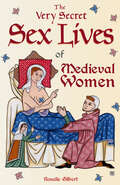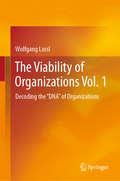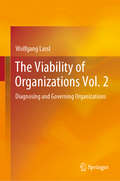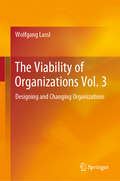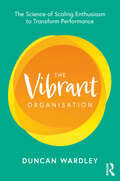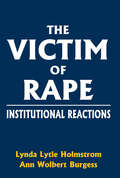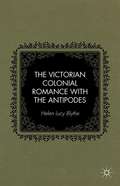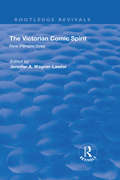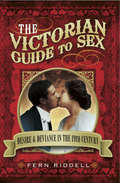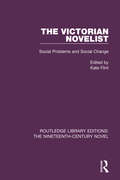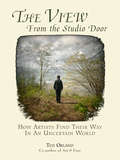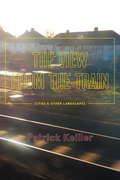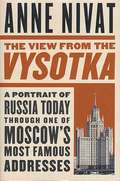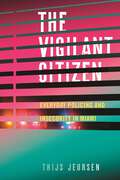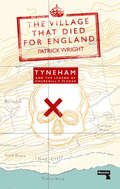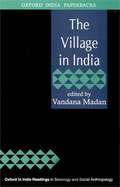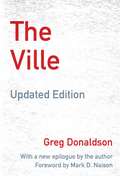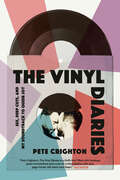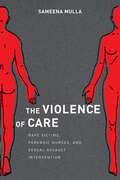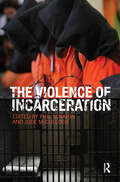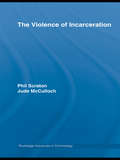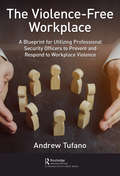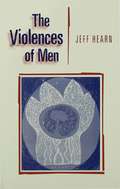- Table View
- List View
The Very Secret Sex Lives of Medieval Women: An Inside Look At Women And Sex In Medieval Times (true Stories, Women In History)
by Rosalie GilbertA “wickedly entertaining, informative and thought-provoking” look at romance, courtship, and other intimacies behind closed Medieval doors (Dr. Markus Kerr, PhD, MDR).Were medieval women slaves to their husband’s desires, jealously secured in a chastity belt in his absence? Was sex a duty or could it be a pleasure? Did a woman have a say about her own female sexuality, body, and who did or didn’t get up close and personal with it? No. And yes. It’s complicated.The intimate lives of medieval women were as complex as for modern women. They loved and lost, hoped and schemed, were lifted up and cast down. They were hopeful and lovelorn. Some had it forced upon them, others made aphrodisiacs and dressed for success. Some were chaste and some were lusty. Having sex was complicated. Not having sex, was even more so.Inside The Very Secret Sex Lives of Medieval Women, a fascinating book about life during medieval times, you will discover tantalizing true stories about medieval women and a myriad of historical facts. Learn about:The true experiences of women from all classes, including women who made historyThe dos and don’ts in the bedroomSexy foods and how to have themAll you need to know for your wedding night, and well as insider medical adviceHow to get pregnant (and how not to), and more“Quite compelling and hilariously funny. I have been chuckling out loud and my husband says he thinks he ought to read it if it’s such a tonic. God forbid!” —Susanna Newstead, author of the Savernake Novels
The Viability of Organizations Vol. 1: Decoding the "DNA" of Organizations
by Wolfgang LasslToday’s complexity, speed, and need for adaptation are putting organizations under stress. Understanding how organizations function and truly come alive has become a critical competency. And yet, organizations still seem to lack a solid understanding of what constitutes meaningful, viable, and effective organizational structures. Using the Viable System Model (VSM) as a framework, this three-volume compendium volume offers readers a new and comprehensive perspective on organizations and how they function beyond the organizational chart. Moreover, it equips readers with a rigorous methodology for analyzing organizations and addressing deep-seated organizational dysfunctions, while also showing them how to redesign their structures and develop better and more tailor-made solutions. This first volume introduces readers to the VSM and its main components. Readers are taken on a journey, allowing them to rediscover all-too-familiar aspects in the life of their organization and to become aware of the critical success factors for its smooth functioning and long-term viability. In turn, volumes 2 and 3 provide an in-depth introduction to diagnosing and designing organizations with the help of the VSM. For academics, this compendium rediscovers a theoretical perspective that can help them understand macro-structural issues; at the same time, for VSM experts and researchers alike, it resolves many open aspects in the VSM framework.
The Viability of Organizations Vol. 2: Diagnosing and Governing Organizations
by Wolfgang LasslOrganizations are complex social systems, and dysfunctionalities can settle in very quickly and almost unnoticed, costing valuable time and resources. In a highly volatile and complex world where mistakes are virtually unforgivable, the ability to rapidly and accurately diagnose dysfunctionalities, and familiarity with the right governance and leadership principles, have thus become vital for organizations’ success.This volume, the second in a set of three, introduces readers to the Viable System Model (VSM)-based diagnosis and governance of organizations. Readers will be familiarized with a broad range of dysfunctional patterns that can impede an organization’s viability, while also deepening their understanding of organizational viability gained in Volume 1. This volume examines in detail the highly dynamic nature of organizations, the multiple equilibrium systems that need to be kept in mind, and the intricate nature of leadership in organizations. It addresses fundamental organizational and managerial issues/topics such as the functioning of hierarchies, the “right” degree of centralization, the various challenges throughout an organization’s lifecycle, and the vital role of conflicts for organizational health.The insights derived from the VSM in this volume will provide readers with a comprehensive, nuanced, and sound conceptual foundation for questions concerning the diagnosis and governance of organizations, the tasks, challenges and principles of leadership, and the implementation of strategies in organizations.
The Viability of Organizations Vol. 3: Designing and Changing Organizations
by Wolfgang LasslThe design process for organizational structures sometimes resembles a random walk, especially when it is embedded in an arena of competing personal interests and power games. Many organizations still lack clear guidance and are therefore seeking a rigorous, nuanced, and impartial methodology for the design and development of their organizational structures, processes and behavioral repertoire. The Viable System Model (VSM) can help: by identifying the essential design principles and parameters that need to be considered, and which can be used to enhance an organization’s effectiveness, adaptability, cohesion and overall viability.This book, the third volume in a set of three, connects the VSM to the world of the standard organizational chart. It offers readers a new perspective on corporate functions and their contributions to the organization as a whole. Further, it shows them how the VSM can be used to develop viable organizational structures, following a detailed step-by-step approach. Lastly, it explains the vital processes, behaviors, and attitudes that need to be developed in order to make organizations truly viable.Readers will find solutions to, and guidelines on, many critical organizational design issues, e.g. designing job profiles; correctly mapping synergistically (“centrally”) operating units in the organizational chart; outsourcing processes; and handling matrix situations; as well as designing and implementing organizational change processes.
The Vibrant Organisation: The Science of Scaling Enthusiasm to Transform Performance
by Duncan WardleyThe Vibrant Organisation translates the science of human behaviour into a playbook of highly practical interventions that build and scale enthusiasm, transforming organisational culture and performance. The book helps create more joy and fulfilment at work, whilst also steering a path to sustained competitive advantage. Using cutting-edge research in neuroscience and psychology, as well as the author’s considerable practical experience, Duncan Wardley offers a three-part framework for building teams of agile, adaptable, curious, and highly motivated people: Reset shows how to reduce the threat response by creating a safe environment for employees Ignite teaches leaders how to create events or experiences that create flashes of insight and motivation Fuel demonstrates how to sustain people’s motivation through repeatable actions, resulting in an upward spiral of enthusiasm. Packed with fascinating research, on-the-ground stories, and new scientific findings – along with practical tools and exercises – The Vibrant Organisation is a must read for business leaders at all levels looking to get the best out of themselves and their people.
The Victim of Rape: Institutional Reactions
by Lynda Lytle HolmstromThis unprecedented in-depth account of how our major institutions respond to the crime of rape is the first empirical study of rape victims in the United States as they come into contact with those who staff our police stations, hospitals, and courthouses. As this engrossing study makes clear, rape does not end with the assailant's departure; the profound suffering of the victim can be diminished or heightened by the response of these institutions.The authors provide direct, on-the-scene reports of how rape victims confront and endure the often devastating effects of institutional processing. Their work is based on first-hand observations, personal interviews, and case histories that document the rape victim's plight, and includes tables that present all research findings in easy-to-grasp numerical terms. The authors note changes now taking place, and argue that further institutional changes must be made to delegitimize rape in our society.The new introductory essay locates The Victim of Rape within the context of four lines of research: studies looking at the criminal justice system processing of such cases, the connection of rape to everyday life, social-structural and ideological support for rape, and strategies for prevention.
The Victorian Colonial Romance with the Antipodes
by Helen Lucy BlytheThe Victorian Colonial Romance with the Antipodes.
The Victorian Comic Spirit: New Perspectives (Routledge Revivals)
by Jennifer Wagner-LawlorThis title was first published in 2000: "Comedy" and "humour" are not words most associate with the Victorian period, yet their culture was rife with laughter and irony. The 12 essays in this volume reanimate this "comic spirit" by exploring the humour in its social context. While previous studies of humour in the period focus on the age's own ongoing interest in the old distinction in comic theory between wit and humour, this volume aims to show how inadequate this distinction is in accounting for the many types of Victorian comic representation. The essays turn from linguistic or psychological analyses of humour towards the social production of humour and the cultural dynamics which underlie it.
The Victorian Guide to Sex: Desire & Deviance in the 19th Century
by Fern Riddell“An enjoyable read and an informative survey of Victorian sexual tastes and preoccupations . . . a rigorously balanced account of this complex subject.” —Victorian SecretsAn exciting factual romp through sexual desire, practices and deviance in the Victorian era. The Victorian Guide to Sex will reveal advice and ideas on sexuality from the late 19th century. Drawing on both satirical and real-life events from the period, it explores every facet of sexuality that the Victorians encountered.Reproducing original advertisements and letters, with extracts taken from memoirs, legal cases, newspaper advice columns, and collections held in the Museum of London and the British Museum, this book reveals historical sexual proclivities.“Riddell’s book lifts the veil on historic sexual attitudes to illuminate the secrets of our ancestors’ lives. Written with wry humour in a pastiche of Victorian style, the book is both entertaining and highly informative.” —Your Family Tree
The Victorian Novel, Service Work, and the Nineteenth-Century Economy (Palgrave Studies in Nineteenth-Century Writing and Culture)
by Joshua GoochThis book offers a much-needed study of the Victorian novel's role in representing and shaping the service sector's emergence. Arguing that prior accounts of the novel's relation to the rise of finance have missed the emergence of a wider service sector, it traces the effects of service work's many forms and class positions in the Victorian novel.
The Victorian Novelist: Social Problems and Change (Routledge Library Editions: The Nineteenth-Century Novel #14)
by Kate FlintFirst published in 1987. Many Victorian novels that considered social problems made extensive use of contemporary source material for their descriptions. This book aims to provide a greater acquaintance with this non-literary material — illustrating and exemplifying issues that the authors treated imaginatively. The material is divided into parts dealing with: the industrial north of England, London and the agricultural poor. Extracts from writings that bear directly on the fiction of writers like Dickens and Gaskell are featured, as are Government Blue Books and newspaper reports and articles. This volume also contains articles by Dickens and others, from his magazine, Household Words.
The View From The Studio Door
by Ted OrlandIn the perennial best-seller Art & Fear, Ted Orland (with David Bayles) examined the obstacles that artists encounter each time they enter their studio and stand before a new blank canvas. Now, in The View From The Studio Door, Orland turns his attention to broader issues that stand to either side of that artistic moment of truth.In a text marked by grace, brevity and humor, Orland argues that when it comes to art making, theory and practice are always intertwined. There are timeless philosophical questions (How do we make sense of the world?) that address the very nature of art making, as well as gritty real-world questions (Is there art after graduation?) that artists encounter the moment they're off the starting blocks and producing work on a regular basis.Simply put, this is a book of practical philosophy. As a teacher and working artist himself, Orland brings authentic insight and encouragement to all those who face the challenge of making art in an uncertain world. The breadth of material covered is reflected in chapters that include Making Sense of the World, Art & Society, The Education of the Artist, Surviving Graduation, Making Art That Matters, The Artistic Community, and more.The View From The Studio Door is the perfect companion piece to Art & Fear, and will appeal to a similar (and already-established) audience of students, working artists, teachers and professionals. For students' benefit, The View is also modestly priced, with wide page margins for easy note-taking and annotation.
The View From The Train
by Patrick Keiller"Robinson believed that, if he looked at it hard enough, he could cause the surface of the city to reveal to him the molecular basis of historical events, and in this way he hoped to see into the future." In his sequence of films, Patrick Keiller retraces the hidden story of the places where we live, the cities and landscapes of our everyday lives. Now, in this brilliant collection of essays, he offers a new perspective on how Britain works and sees itself. He discusses the background to his work and its development - from surrealism to post-2008 economic catastrophe - and expands on what the films reveal. Referencing writers including Benjamin and Lefebvre, the essays follow his career since the late 1970s, exploring themes including the surrealist perception of the city; the relationship of architecture and film; how cities change over time, and how films represent this; as well as accounts of cross-country journeys involving historical figures, unexpected ideas and an urgent portrait of post-crash Britain.From the Hardcover edition.
The View From the Corner Shop: The Diary of a Yorkshire Shop Assistant in Wartime
by Kathleen HeyKathleen Hey spent the war years helping her sister and brother-in-law run a grocery shop in the Yorkshire town of Dewsbury. From July 1941 to July 1946 she kept a diary for the Mass-Observation project, recording the thoughts and concerns of the people who used the shop. What makes Kathleen's account such a vivid and compelling read is the immediacy of her writing. People were pulling together on the surface ('Bert has painted the V-sign on the shop door…', she writes) but there are plenty of tensions underneath. The shortage of food and the extreme difficulty of obtaining it is a constant thread, which dominates conversation in the town, more so even than the danger of bombardment and the war itself. Sometimes events take a comic turn. A lack of onions provokes outrage among her customers, and Kathleen writes, 'I believe they think we have secret onion orgies at night and use them all up. ' The Brooke Bond tea rep complains that tea need not be rationed at all if supply ships were not filled with 'useless goods' such as Corn Flakes, and there is a long-running saga about the non-arrival of Smedley's peas. Among the chorus of voices she brings us, Kathleen herself shines through as a strong and engaging woman who refuses to give in to doubts or misery and who maintains her keen sense of humour even under the most trying conditions. A vibrant addition to our records of the Second World War, the power of her diary lies in its juxtaposition of the everyday and the extraordinary, the homely and the universal, small town life and the wartime upheavals of a nation.
The View from the Vysotka
by Anne Nivat Frances E. ForteCompleted shortly before Joseph Stalin's death in 1953, the vysotkii, or "sky houses," still dominate the Moscow skyline today. Seven in all, they were the Soviet answer to the American skyscraper, transforming the Soviet capital from a feudal backwater into the city of the future. With their soaring towers and gothic architectural details, the vysotkas were intended to be enduring monuments to the workers state and to the glories of Communism--though they were built on the backs of slave laborers and, initially, the prerogative only of the Soviet elite. Now these imposing giants lie on the fault line between a world that has vanished and one still emerging from its ruins.When she moved to Moscow several years ago, journalist and Russia expert Anne Nivat settled into one of the vysotkas, the one that happens to overlook the Kremlin. She became fascinated by the building and learned everything she could about its history. As she got to know her neighbors and fellow tenants, Nivat discovered that they included some of the building's original inhabitants or their descendants, hand-chosen by Stalin and his henchman Lavrenti Beria (arrested and executed for high treason shortly after Stalin's death)--KGB operatives, Bolshoi ballerinas, and artists of Soviet agitprop. Living side by side with them were representatives of the "new Russia"--entrepreneurs, foreign investors, and oligarchs; as any Moscow real estate agent will tell you, Stalin-era buildings in today's market are some of the most coveted addresses in the city.By means of this decaying but still elegant Soviet icon, Nivat gives us a way of grasping the complexities of a country struggling to come to terms with its past and define its future. She allows the tenants of her vysotka to speak for themselves, to offer their perspectives on where Russia has been and where it is going. Some are keenly nostalgic for the days when the State dictated life. Others have prospered in the confusion that has reigned since the Evil Empire's fall and look to a market-driven economy to guide Russia to the Promised Land. Still others fall some place between the two, anxious but hopeful, longing for yet also fearful of change. Taken together, the portraits of the vysotka's inhabitants provide a panorama of Russia today. The View from the Vysotka shows us life from the inside, evoking both the forces that have swept through this vast and fascinating nation over the course of the last half-century, as well as a building that has managed to endure them.
The Vigilant Citizen: Everyday Policing and Insecurity in Miami
by Thijs JeursenHow the problematic behavior of private citizens—and not just the police force itself—contributes to the perpetuation of police brutality and institutional racism“Warning: Neighborhood Watch Program in Force. If I don’t call the police, my neighbor will!”Signs like this can be found affixed to telephone poles on streets throughout the US, warning trespassers that the community is an active participant in its own policing efforts. Thijs Jeursen calls this phenomenon, in which individuals take on the responsibility of defending themselves and share with the police the duty to mitigate everyday insecurity, “vigilant citizenship.”Drawing on eleven months of fieldwork in Miami and sharing the stories and experiences of police officers, private security guards, neighborhood watch groups, civil society organizations, and a broad range of residents and activists, Jeursen uses the lens of vigilant citizenship to extend the analysis of police brutality beyond police encounters, focusing on the often blurred boundaries between policing actors and policed citizens and highlighting the many ways in which policing produces and perpetuates inequality and injustice. As a central premise in everyday policing, vigilant citizenship frames racist and violent policing as matters of personal blame and individual guilt, ultimately downplaying the realities of how systemically race operates in policing and US society more broadly. The Vigilant Citizen illustrates how a focus on individualized responsibility for security exacerbates and legitimizes existing inequalities, a situation that must be addressed to end institutionalized racism in politics and the justice system.
The Village That Died for England: Tyneham and the Legend of Churchill's Pledge
by Patrick WrightA reissue of Patrick Wright's 1995 classic about the military takeover of the village of Tyneham, with a new introduction taking in Brexit and a new wave of British nationalism.Shortly before Christmas in 1943, the British military announced they were taking over a remote valley on the Dorset coast and turning it into a firing range for tanks in preparation for D-Day. The residents of the village of Tyneham loyally packed up their things and filed out of their homes into temporary accommodation, yet Tyneham refused to die. Although it was never returned to its pre-war occupants and owners, Tyneham would persist through a long and extraordinary afterlife in the English imagination. It was said that Churchill himself had promised that the villagers would be able to return once the war was over, and that the post-war Labour government was responsible for the betrayal of that pledge. Both the accusation and the sense of grievance would reverberate through many decades after that.Back in print and with a brand new introduction, this book explores how Tyneham came to be converted into a symbol of posthumous England, a patriotic community betrayed by the alleged humiliations of post-war national history. Both celebrated and reviled at the time of its first publication in 1995, The Village that Died for England is indispensable reading for anyone trying to understand where Brexit came from — and where it might be leading us.
The Village in India
by Vandana MadanThe village has epitomized Indian civilization and been the subject of much study and contemplation. The essays clearly demonstrate that every Indian village, although similar in many ways, is also characterized by regional variations.
The Ville: Cops and Kids in Urban America, Updated Edition
by Greg DonaldsonIn Brownsville’s twenty-one housing projects, the young cops and the teenagers who stand solemnly on the street corners are bitter and familiar enemies. The Ville, as the Brownsville–East New York section of Brooklyn is called by the locals, is one of the most dangerous places on earth—a place where homicide is a daily occurrence. Now, Greg Donaldson, a veteran urban reporter and a longtime teacher in Brooklyn’s toughest schools, evokes this landscape with stunning and frightening accuracy.The Ville follows a year in the life of two urban black males from opposite sides of the street. Gary Lemite, an enthusiastic young Housing police officer, charges recklessly into gunfire in pursuit of respect and promotion. Sharron Corley, a member of a gang called the LoLifes and the star of the Thomas Jefferson High School play, is also looking for respect as he tries to survive these streets.Brilliantly capturing the firestorm of violence that is destroying a generation, waged by teenagers who know at thirty yards the difference between a MAC-10 machine pistol and a .357 Magnum, The Ville is the story of our inner cities and the lives of the young men who remain trapped there. In the tradition of There Are No Children Here, Clockers, and Random Family, The Ville is a vivid and unforgettable contribution to our understanding of race and violence in America today.
The Vinyl Diaries: Sex, Deep Cuts, and My Soundtrack to Queer Joy
by Pete CrightonA poignant, funny, and lively memoir of sexual awakening, music, and discovering one's true self. Pete Crighton came of age in the early/mid 1980s in the shadow of HIV/AIDS. Growing up in Toronto, he was terrified that his friends and schoolmates would find out that he was &“different&” at a time when being gay felt like a death sentence. His only comfort was music, the songs a balm to his painful adolescence. Struggling to make sense of his sexuality and fear of the disease stifled Crighton as a sexual being. Instead of exploring sex, he began curating a massive music library. He then took what he thought was a safe path and entered into two long-term monogamous relationships, both doomed to fail. Finally, in his 40s, Crighton decided to ignore his fear and live his queer life to the fullest.The Vinyl Diaries is the story of Crighton&’s mid-life sexual awakening. From one-night trysts to friendships resulting from app-based hookups, Crighton is honest and unapologetic as he chronicles the pursuit of his erotic desires. Each new connection and lover is linked to an artist, song, or album from his vast collection and backdrops the stories Crighton tells about his life, interconnected with the artists' work and histories. Kate Bush, the B-52s, Prince, The Smiths, Yoko Ono, and Stevie Nicks are just a few of the artists who provide an extraordinary soundtrack to Crighton&’s adventures.Big-hearted, funny, thoughtful, and wildly entertaining, The Vinyl Diaries is a celebration of sex, music and the discovery of our true selves.
The Violence of Care: Rape Victims, Forensic Nurses, and Sexual Assault Intervention
by Sameena MullaWinner, 2017 Margaret Mead Award presented by the American Anthropological Association and the Society for Applied AnthropologyHonorable Mention, 2015 Eileen Basker Memorial Prize presented by the Society for Medical Anthropology Analyzes the ways in which nurses work to collect and preserve evidence while addressing the needs of sexual assault victims as patientsEvery year in the US, thousands of women and hundreds of men participate in sexual assault forensic examinations. Drawing on four years of participatory research in a Baltimore emergency room, Sameena Mulla reveals the realities of sexual assault response in the forensic age. Taking an approach developed at the intersection of medical and legal anthropology, she analyzes the ways in which nurses work to collect and preserve evidence while addressing the needs of sexual assault victims as patients.Mulla argues that blending the work of care and forensic investigation into a single intervention shapes how victims of violence understand their own suffering, recovery, and access to justice—in short, what it means to be a “victim”. As nurses race the clock to preserve biological evidence, institutional practices, technologies, and even state requirements for documentation undermine the way in which they are able to offer psychological and physical care. Yet most of the evidence they collect never reaches the courtroom and does little to increase the number of guilty verdicts. Mulla illustrates the violence of care with painstaking detail, illuminating why victims continue to experience what many call “secondary rape” during forensic intervention, even as forensic nursing is increasingly professionalized. Revictimization can occur even at the hands of conscientious nurses, simply because they are governed by institutional requirements that shape their practices.The Violence of Care challenges the uncritical adoption of forensic practice in sexual assault intervention and post-rape care, showing how forensic intervention profoundly impacts the experiences of violence, justice, healing and recovery for victims of rape and sexual assault.
The Violence of Incarceration (Routledge Advances In Criminology Ser. #Vol. 5)
by Phil Scraton Jude McCullochConceived in the immediate aftermath of the humiliations and killings of prisoners in Afghanistan and Iraq, of the suicides and hunger strikes at Guantanamo Bay and of the disappearances of detainees through extraordinary rendition, this book explores the connections between these shameful events and the inhumanity and degradation of domestic prisons within the 'allied' states, including the USA, Canada, Australia, the UK and Ireland.The central theme is that the revelations of extreme brutality perpetrated by allied soldiers represent the inevitable end-product of domestic incarceration predicated on the use of extreme violence including lethal force. Exposing as fiction the claim to the political moral high ground made by western liberal democracies is critical because such claims animate and legitimate global actions such as the 'war on terror' and the indefinite detention of tens of thousands of people by the United States which accompanies it. The myth of moral virtue works to hide, silence, minimize and deny the brutal continuing history of violence and incarceration both within western countries and undertaken on behalf of western states beyond their national borders.
The Violence of Incarceration (Routledge Advances in Criminology #Vol. 5)
by Phil Scraton Jude McCullochConceived in the immediate aftermath of the humiliations and killings of prisoners in Afghanistan and Iraq, of the suicides and hunger strikes at Guantanamo Bay and of the disappearances of detainees through extraordinary rendition, this book explores the connections between these shameful events and the inhumanity and degradation of domestic prisons within the 'allied' states, including the USA, Canada, Australia, the UK and Ireland. The central theme is that the revelations of extreme brutality perpetrated by allied soldiers represent the inevitable end-product of domestic incarceration predicated on the use of extreme violence including lethal force. Exposing as fiction the claim to the political moral high ground made by western liberal democracies is critical because such claims animate and legitimate global actions such as the 'war on terror' and the indefinite detention of tens of thousands of people by the United States which accompanies it. The myth of moral virtue works to hide, silence, minimize and deny the brutal continuing history of violence and incarceration both within western countries and undertaken on behalf of western states beyond their national borders.
The Violence-Free Workplace: A Blueprint for Utilizing Professional Security Officers to Prevent and Respond to Workplace Violence
by Andrew TufanoOrganizations are ethically, morally, and legally required to maintain safe workplaces that protects employees, visitors and anyone who frequents their establishments. But why do organizations that employee uniformed security personnel as part of their overall workplace violence prevention program still struggle to create and maintain the safest possible workplaces? To meet these obligations organizations often employ uniformed security officers to deter, observe, and report criminal behavior, and in some contexts, they physically interact with dangerous individuals to protect employees, consumers and visitors from violent behaviors. Unfortunately, many organizations don’t utilize their security personnel to their fullest potential and organizational and community members continue to be victims of workplace violence. This book identifies the flawed principles, policies and personnel decisions that organizations use, and it provides practical solutions to address them. The book covers two major themes: the misapplication of law enforcement community safety principles to private, free-market businesses and the use of risk aversive philosophies to their security officer’s activities. This book covers the principles, policies and personnel necessary for maximizing the effectiveness of uniformed security personnel to successfully mitigate potential workplace violence and create and maintain safe organizations. There is a strong need for this book since workplace violence prevention has taken on a new focus due to increases in workplace violence incidents and new laws requiring organizations to take a more serious approach to workplace violence prevention. The healthcare and campus markets are most affected by these laws and are under public scrutiny because of their vulnerable populations. These two markets combined employ the most non-contract, propriety private security personnel in the country. Both markets rely on uniform security officers to create and maintain safe communities and play an important role in their respective workplace violence prevention plans.
The Violences of Men: How Men Talk About and How Agencies Respond to Men's Violence to Women
by Jeff R HearnAddressing the problem of men's violence to known women, this book considers the scale of, and critically reviews the theoretical frameworks used to explain this violence. From the perspective of `critical studies on men', Jeff Hearn discusses issues, challenges and possible research methods for those researching violence. He draws on extensive research to analyze the various ways in which men describe, deny, justify and excuse their violence, and considers the complex interaction between doing violence and talking about violence. The book concludes with a summary of the key issues for theory, politics, policy and practice.
